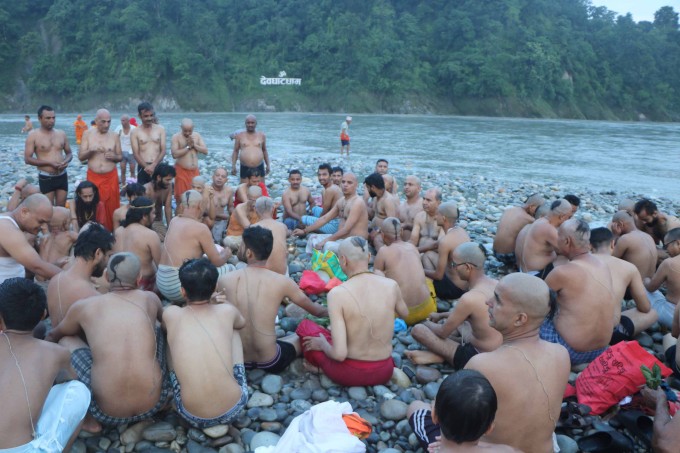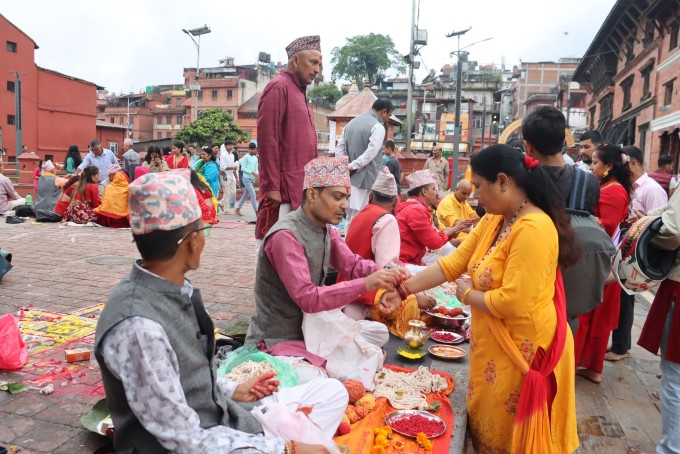Nom Rana, 35, began his career as a comic artist when he was 16 years old. "I recall making a comic about a character with a large bone head. I called him ‘Big Bone Head’ and that was my very first comic."
Growing up watching cartoons, he, like any other kid, was fascinated by the colors since 90s cartoons were rich in character designs, from Ninja turtles and Streetfighter to Sonic and many more. He thought it was so bizarre that he wanted to sketch them himself.
When asked who affected him the most, he cited Salvador Dali's surrealist art. "Comic books like Calvin & Hobbes, Mr. Kiasu, and Old Master Q were one of the primary influences in my comics and the basis for my drive force towards it," he continues.
"When you're young, you're unaware of realities and responsibilities. I was the same way. I thought becoming an artist would be enjoyable; I'd sketch all day and get money, but it wasn't what I expected," he says.
It is difficult for comic artists to establish themselves in Nepal. Rana's comedy combines western humor and pops cultural elements, which makes it tough to mix in with the audience, as people prefer arts with a Nepali twist. It was difficult for him to strive to be relevant because it did not complement his art style.
He continues, "If I draw a very wacky amazing character, people here won't pay much attention to it. People start paying attention to it when I add a Dhaka topi and adjust its pose to practicing namaste."
With time, he realized that the comic culture in Nepal needed to be more relevant so that people could relate to it. He then constantly started seeking new ways to be relevant while remaining true to his artistic style.
"I decided to make my comic more fun and intriguing by making it about what I'm going through or how I perceive my regular life," he explains. However, he believes that younger generations are appreciating practically every form of a comic.
Even though he had few readers when he first started drawing comics, the replies he received from them were pleasantly positive. With the rise of social media platforms such as Instagram, people other than his fans began to view it.
Success comes at a high cost and does not come overnight. "It's not easy to express your tale through comics. You may have the entire scenario in your head, but putting it on paper is difficult. There are often needless sequences or monologues, or the angle doesn't look correct," Rana says.
One of his favorite pieces is ‘Momo Boya’, which he feels is wacky yet cute. Another one is Chopra (The boy with a toad headgear). “Without knowing, I always smirk when I draw him wearing slippers and his personality adds an extra point to it. When it comes to drawing, I like to be free and stress less as one should enjoy when they’re doing their work.”
Rana used to imagine his life as an artist-driven career person, but things don't always go as planned. He attempted to make a profession out of anything from storyboarding to posters, record illustrations to infographics. Being able to draw without any conditions led him to abandon commission-based employment and begin creating comics for himself for fun.
For someone who wants to pursue a career as a comic artist, Rana says, “It is very tough as the comic trend in Nepal is still a far fetch. No one buys a comic book, not enough to make a living because nowadays, everyone can read one on the internet.” He further says that one should especially not give up if this gives them happiness.
Rana emphasizes on comic book readers to continue to support local artists as it encourages them in a world where comics are no longer printed in hardcopy but are read online.
“I always look forward to drawing new characters and when I make one, I start falling in love with it,” he expresses. Rana believes that everyone is built to think differently when it comes to creativity and says there is no process to it. He adds, “Now, looking back at my creations, I cringe.”
READ ALSO:







